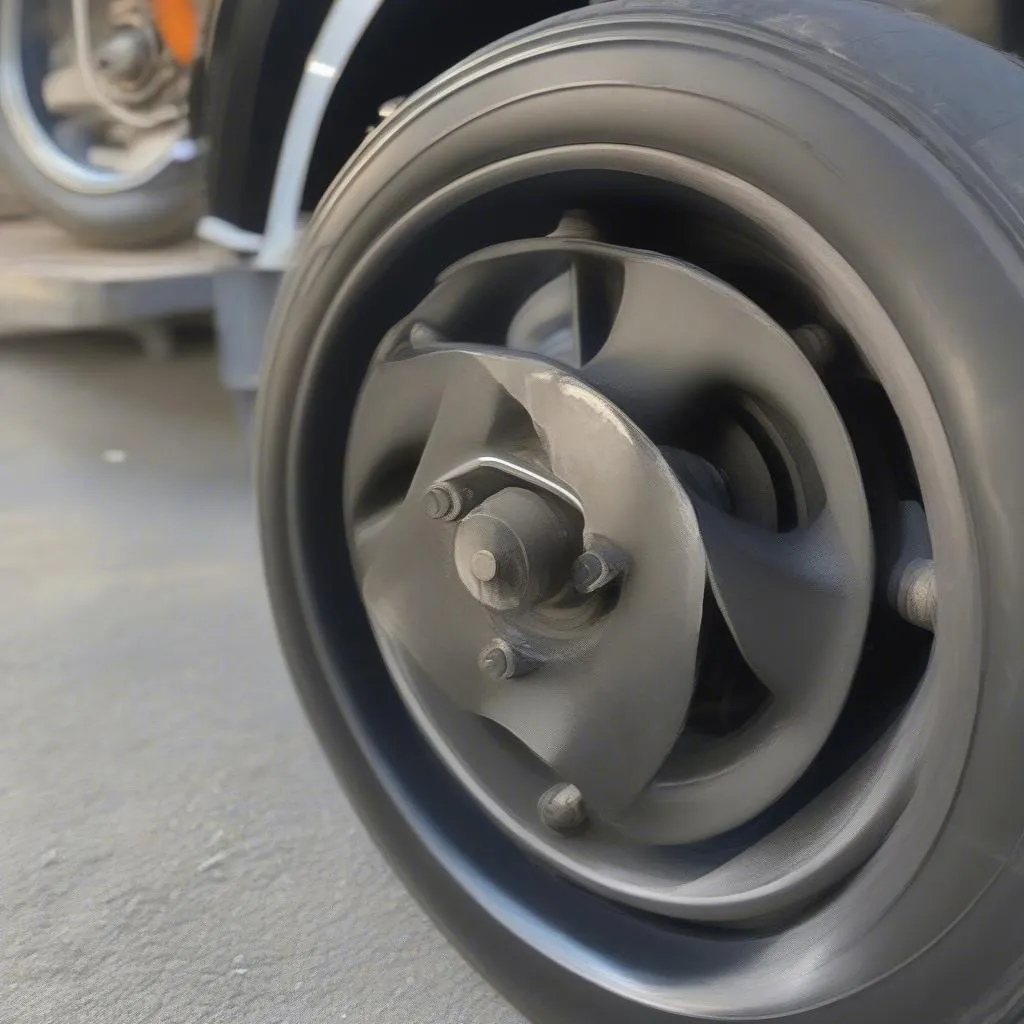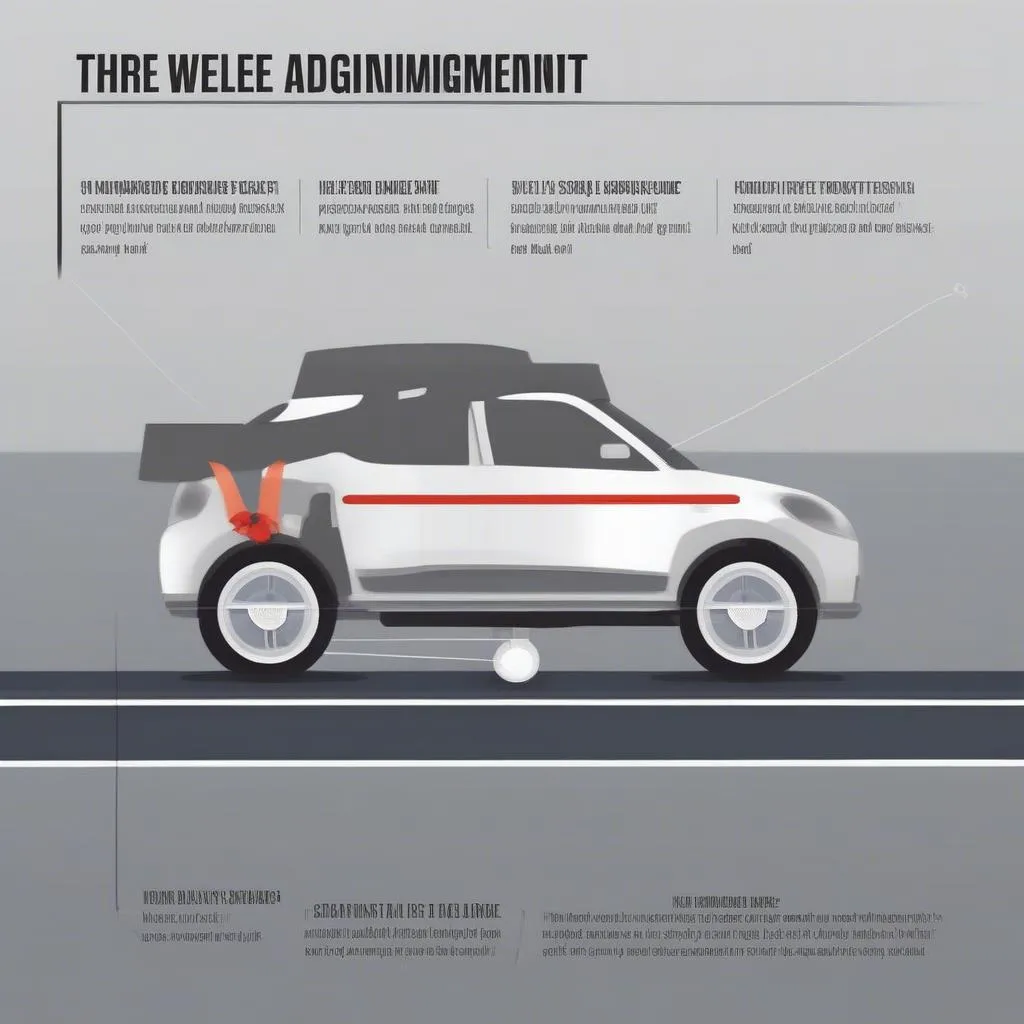Imagine this: You’re cruising down the highway, enjoying the open road and the wind in your hair. Suddenly, your car starts to shake violently, sending shivers down your spine. It’s like riding a bucking bronco, and you desperately try to keep your vehicle under control. This is the dreaded “wheel vibration at high speeds,” a common problem that can make driving a nightmare.
What Does It Mean When Your Car Vibrates at High Speeds?
Wheel vibration at high speeds is a symptom, not a diagnosis. It indicates that something is out of balance or misaligned in your car’s suspension, wheels, or tires. This issue can impact driving comfort, vehicle stability, and even tire wear.
From a Mechanic’s Perspective
“Wheel vibration at high speeds is one of those issues that can make you cringe,” says John Smith, a veteran mechanic with over 20 years of experience in the auto repair industry. “It’s not just uncomfortable for the driver, it can also be a safety hazard. If left untreated, it can lead to tire damage, suspension component failure, and even accidents.”
The Technical Angle
Wheel vibration is caused by a disturbance in the smooth rotation of your wheels. This disturbance creates a force that travels through the car’s suspension, causing the whole vehicle to shake. The frequency of the vibration often corresponds to the speed of the vehicle, meaning it gets worse at higher speeds.
The Economic Impact
Wheel vibration can affect your wallet too. Unbalanced or misaligned wheels can accelerate tire wear, leading to premature replacement costs. Additionally, neglecting this issue can cause damage to other parts of your car’s suspension, requiring more expensive repairs down the line.
Diagnosing Wheel Vibration
Diagnosing the cause of wheel vibration requires a skilled mechanic with a systematic approach. They will likely follow these steps:
- Visual Inspection: This includes examining the tires, wheels, suspension components, and brakes for any visible signs of damage, wear, or loose parts.
- Road Test: The mechanic will take the car for a test drive to experience the vibration firsthand and determine its characteristics (frequency, intensity, and speed range).
- Wheel Balancing: This is a basic procedure that involves adding weights to the wheel to ensure it rotates smoothly.
- Wheel Alignment: This process adjusts the angles of your wheels to ensure they are properly aligned with each other and the vehicle.
- Tire Inspection: Checking for uneven wear, tread separation, or other issues that may contribute to vibration.
- Suspension Inspection: A thorough examination of the suspension components for wear, damage, or loose parts.
Common Causes of Wheel Vibration at High Speeds
There are several common causes of wheel vibration at high speeds, including:
1. Unbalanced Wheels:
Unbalanced wheels are the most common culprit behind this problem. Imagine a wheel as a spinning top. If the weight is unevenly distributed, the top will wobble as it spins. The same principle applies to car wheels. If a wheel isn’t properly balanced, it will vibrate at high speeds.
 Wheel Unbalanced
Wheel Unbalanced
2. Misaligned Wheels:
Misaligned wheels can also cause vibration. Imagine a car’s wheels as a set of parallel lines. If one line is slightly off, it will cause the vehicle to pull in one direction. This misalignment can also lead to uneven tire wear and contribute to vibration.
 Wheel Alignment
Wheel Alignment
3. Damaged Tires:
Damaged tires, such as those with uneven tread wear, tread separation, or punctures, can lead to vibration. These issues disrupt the smooth rolling motion of the tire, causing it to wobble and shake the vehicle.
4. Bent Wheels:
A bent wheel can be a major cause of vibration, especially at high speeds. This often occurs due to a pothole impact or curb rash.
5. Worn Suspension Components:
Worn suspension components, such as ball joints, tie rod ends, control arm bushings, or shock absorbers, can cause wheel vibration. These components play a critical role in maintaining the stability of the vehicle and absorbing road shocks.
Troubleshooting Tips
Here are some tips to help you troubleshoot wheel vibration at high speeds:
- Identify the Speed Range: Note at what speeds the vibration occurs. This will help you pinpoint the cause. For instance, vibration that starts around 60 mph might indicate a tire balance issue, while vibration that begins at 80 mph could point to a suspension problem.
- Check Your Tires: Inspect your tires for uneven wear, tread separation, bulges, or any other signs of damage.
- Look for Loose Parts: Examine the suspension components for any loose bolts, nuts, or other parts that may be causing the vibration.
- Consider Road Conditions: Rough roads or potholes can cause damage to wheels and tires.
- Listen for Unusual Noises: Pay attention to any unusual noises coming from your car’s suspension, wheels, or tires. These noises could be a sign of a problem.
Seeking Professional Help
If you’re unable to diagnose the cause of the vibration yourself, it’s always best to consult a professional mechanic. They have the experience and equipment needed to accurately identify the problem and provide the right solution.
Frequently Asked Questions
Q: My car vibrates only at certain speeds. What does that mean?
A: This is a common occurrence and can indicate specific issues. For example, vibration around 60 mph often points to a tire balance problem. Vibration that starts at 80 mph could be a suspension or wheel alignment issue.
Q: How much does it cost to fix wheel vibration?
A: The cost can vary depending on the cause. Balancing your wheels is relatively inexpensive, while replacing a bent wheel or worn suspension component can be more costly.
Q: What should I do if my car is vibrating violently?
A: If your car is vibrating violently, it’s best to pull over to a safe location and contact a mechanic. It’s crucial to avoid driving a car with severe vibration as it can be dangerous.
Related Articles
- Car Shakes at High Speed
- Car Shaking at Highway Speeds
- Tire Vibration at Low Speeds
- Shaky Car at High Speeds
- Vehicle Shakes at High Speeds
Let’s Keep the Conversation Going
Have you experienced wheel vibration at high speeds? Share your story and any troubleshooting tips you’ve learned in the comments section below!
Do you have other questions or need help with your car? Don’t hesitate to contact us on Whatsapp: +84767531508! Our team of experts is available 24/7 to assist you with all your car repair and maintenance needs.
Remember: Driving safely is paramount. If you experience wheel vibration at high speeds, don’t ignore it. Address the issue promptly to ensure a smooth and comfortable ride.